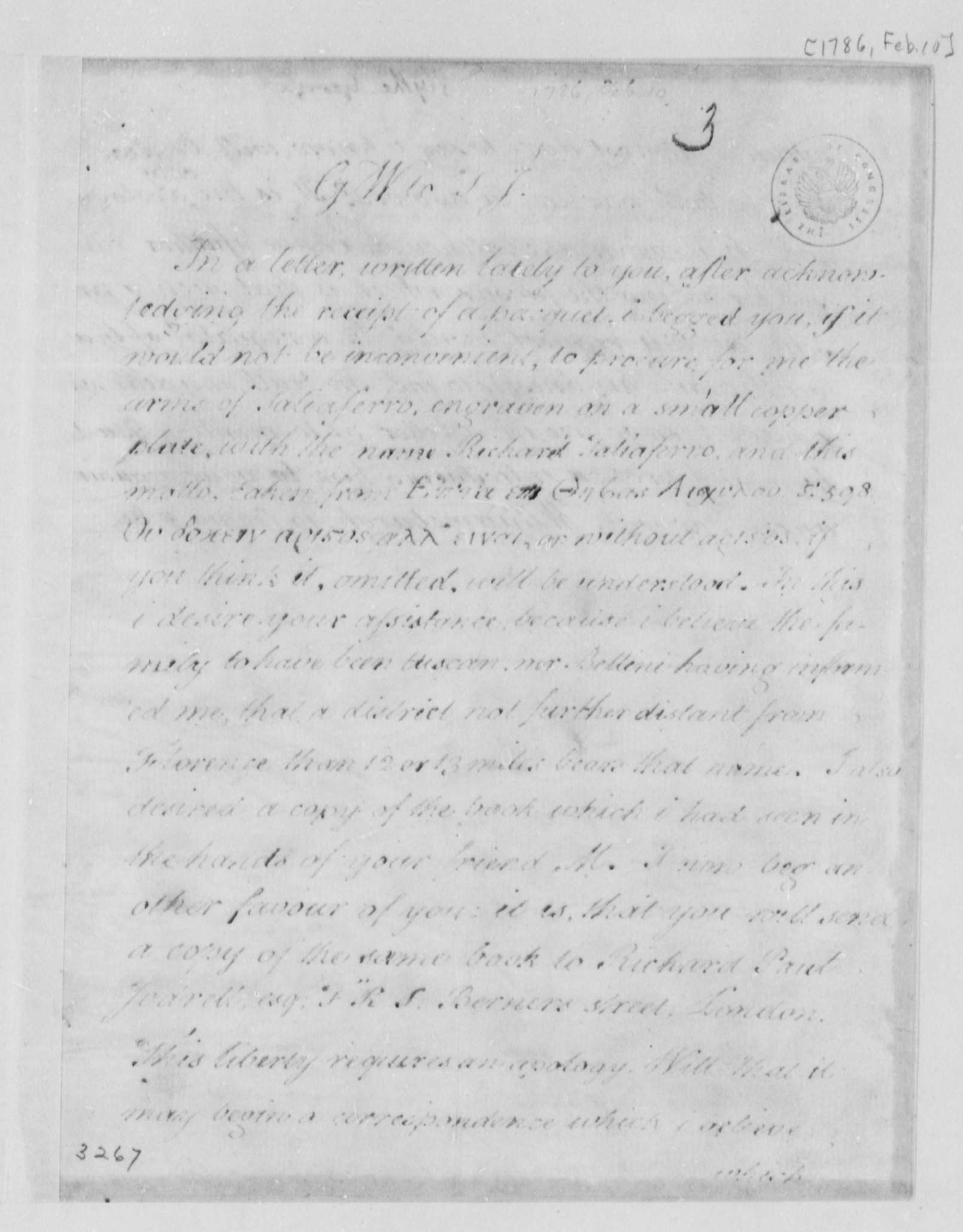Wythe to Thomas Jefferson, 10 February 1786

"Wythe to Thomas Jefferson, 10 February 1786, pg 1." Image from the Library of Congress, The Thomas Jefferson Papers.
George Wythe reminds Thomas Jefferson of the engraving he asked for in his letter on January 10 and provides the name of a person who can help him if he needs assistance with the plate. Wythe goes on to ask Jefferson to send a copy of a book he had seen one of Jefferson's friends reading. He also asks Jefferson to send a copy of the same book to Richard Paul Jodrell.[1] Wythe apologizes for asking Jefferson to send the book, but hopes that a pleasing correspondence between Jefferson and Jodrell will make up for Wythe's request.[2]
Contents
[hide]Letter text
Page 1
GW to TJ
In a letter, written lately to you, after acknowledging the receipt of a pacquet, i begged you, if it would not be inconvenient, to procure for me the arms of Taliaferro, engraven on a small copper plate, with the name Richard Taliaferro, and this motto, taken from Επτα επι Θηβας Αισχυλου, S.598.[3] Ου δοκειν αριστος αλλ' ειναι or without action, αριστος, if you think it, omitted, will be understood.[4] In this i desire your assistance, because i believe the family to have been Tuscan, mr. Bellini, having informed me that a district not further distant from Florence than 12 or 13 miles bears that name. I also desired a copy of the book which i had seen in the hands of your friend M. I now beg an other favour of you: it is, that you will send a copy of the same book to Richard Paul Jodrell esq. F R S. Berners street, London. This liberty requires an apology. Will that it may begin a correspondence which i believe which
Page 2

"Wythe to Thomas Jefferson, 10 February 1786, pg 2." Image from the Library of Congress, The Thomas Jefferson Papers.
which i almost dare to say i know, will be pleasing to both parties, be allowed? It is the only apology which i can make; although i have a further reason for asking the favour, which is that such a present, at my request, would be a requital of that gentleman’s kindnesses to me. In truth, my dear sir, i have been so free in a letter as to mention you to him, and propose introducing him to your acquaintance. Farewell. Williamsburgh, 10 februa. 1786.
See also
- Will of Richard Taliaferro
- Wythe to Thomas Jefferson, 10 January 1786
- Thomas Jefferson to Wythe, 29 May 1786
References
- Jump up ↑ The book in question is Jefferson's Notes on the State of Virginia, published in Paris in 1785.
- Jump up ↑ "To Thomas Jefferson from George Wythe, 10 February 1786," Founders Online, National Archives.
- Jump up ↑ Aeschylus' Seven Against Thebes. Wythe's set Hai tou Aischylou Trageodiai Seozomenai Hepta included a copy of the play.
- Jump up ↑ The line from Aeschylus' Seven Against Thebes concerns the commander Amphiaraus, whose shield bore no sigil, since he is "One who wants to be, not to seem, the best." Wythe's shortening (and leaving out "best") renders the motto, "Not to seem but to be."